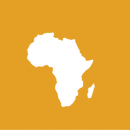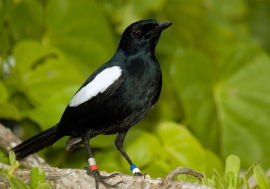Africa Watch
Encouraging signs for the Republic of Congo’s economy
By Pavithra Rao

Despite a recent of history of ethnic and political tensions, including a civil war over its highly-prized natural resources, the Republic of Congo’s economy is set for impressive growth, according to economists. An economic forecast of 7.6% growth over the next three years will be propelled by abundant natural resources, including oil, natural gas and diamonds. Congo’s growth is expected to help dent poverty in the country, which the World Bank says is about 70%.
The Republic of Congo is one of sub-Saharan Africa’s top five major oil producers, according to the International Monetary Fund. Oil is the country’s dominant income-generating source. In fact, in 2011, oil accounted for nearly 80% of the country’s total revenue. It currently produces around 250,000 barrels of crude per day, which is shipped to China, the European Union and the United States, according to the Global Trade Atlas, an online organization that provides information on trade statistics.
Over-reliance on a single commodity has its drawbacks, economists warn. Already, there is a decline in Congo’s maturing oil fields, which will lead to a decrease in production for the short term. However, the government is moving fast to supplement this decrease by issuing new onshore and offshore exploitation licences. The U.S. Energy Information Administration states that 10 onshore and offshore oil blocks are being awarded this year. The recent drop in the international price of oil to below $80 per barrel by last November is expected to impact negatively on Congo’s oil.
In addition to the volatility in the oil industry, the World Bank says obstacles to Congo’s growth include uneven distribution of resources between infrastructure and the social sectors, poor absorptive capacity in investment spending and a weak expenditure chain. Congo has also been criticised for earmarking $60 million for the 2015 All Africa Games in Brazzaville, its capital city, despite its high poverty. The country must address these problems, first and foremost, before it can begin to reach its potential, states the World Bank.
Even as it explores new oil sources, the World Bank also advises the Congolese government to invest heavily in infrastructure in order to boost the growth of non-extractive sectors. Overall, the bank believes the country could witness impressive economic growth in the years to come.
Stepping up efforts to end violence against women in Africa
By Ying M. Zhao-Hiemann

The International Day for the Elimination of Violence against Women observed on 25 November marks an important occasion to reflect on the current state of sexual violence in Africa.
Being one of the most severe forms of gender-based violence, sexual violence, which includes rape, gang rape and sexual slavery, is widespread in times of conflict, post-conflict and displacement.
“From Nigeria to Somalia to Mali, we are seeing a heightening of targeted violence against women, girls and their communities as extremists take control of territory,” Ms. Phumzile Mlambo-Ngcuka, Executive Director of UN Women, recently told the UN Security Council.
In 2014 alone, several such incidents made international headlines. In April, 200 school girls from Chibok in northeast Nigeria were kidnapped by Boko Haram, a militant Islamist group, and have not been released to date. In November, more than 200 women and girls in Tabit, North Darfur in Sudan, were reported to have been mass raped, causing a new wave of international concern. The UN Security Council called for a thorough investigation into the incident.
“It is critical that in the process of verifying the facts that the safety of survivors is of paramount concern,” said Zainab Hawa Bangura, the UN Special Representative on Sexual Violence in Conflict.
During her earlier mission to South Sudan, Ms. Bangura was appalled by the extent of sexual violence in the country, where it is frequently used as a political tool and weapon of war.
“What I witnessed in Bentiu is the worst I have seen in my almost 30 years of dealing with this issue,” said Ms. Bangura, commenting on an incident during which hundreds of civilians were massacred in April 2014 and many more were raped.
The UN has a series of initiatives to help address incidents of sexual violence in conflict, post-conflict and displacement situations, by increasing women’s political participation and economic independence, as well as offering them victim counselling services.
To address the importance of gender perspectives in peace processes, UNAMID organized a Global Open Day in El Fasher on 20 November 2014. The forum brought together more than 140 women representatives from the five Darfur states to discuss the role of women in peace, urging all parties “to take special measures to protect women and girls from gender-based violence.”
The women later marched to mark “16 Days of Activism against Gender-Based Violence”, an annual campaign that starts on the International Day to End Violence Against Women (25 November) and ends on Human Rights Day (1 December). The women were joined by staff members of the African Union, UNAMID and government officials.
Meanwhile, in East Africa, UN Women and the Kenya Red Cross are jointly implementing a livelihood project to help displaced Somali women in the Dadaab Refugee Camp in Kenya, helping them to earn a living through agriculture and fend for themselves. In addition, UN Women, the UN agency on gender issues, is also supporting a healing project run by the Somalia Youth Development Network to train community leaders to conduct healing forums for former rape victims in the Benadir Region.
UN Women partners with governments, UN agencies, civil society organizations and other institutions to advocate for ending violence, increase awareness of the causes and consequences of violence and build capacity of partners to prevent and respond to violence. The gender agency also supports expanding access to quality social services to survivors covering safety, shelter, health, justice and other essential services. Policy guidance helps to step up investments in prevention—the most cost-effective, long-term means to stop violence against women.
Editor's note: An earlier version of this story mentioned Sudan, in error, as the country visited by the UN Special Representative on Sexual Violence in Conflict, Zainab Hawa Bangura. The special representative visited South Sudan, not Sudan, during her mission. The error is sincerely regretted.















